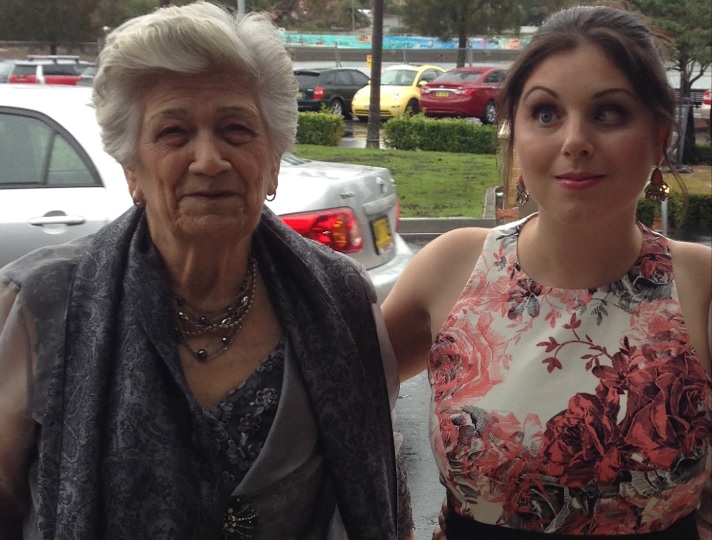One of the exceptions is Triple J newsreader Nas Campanella, who heads to work each week with the pleasure of knowing she’ll deliver the news to just under 2 million listeners across the nation.
It hasn’t always been a smooth road for the ambitious Sydneysider, however, and her successful career is the product of tireless work and great determination.
Campanella has been vision-impaired for most of her life, having lost her sight at six months of age when blood vessels burst in the back of her eyes, damaging the retinas.
In addition to not being able to see, she also lives with a genetic disease called Charcot-Marie-Tooth, meaning she lacks sensitivity in her fingertips and hands and, subsequently, can’t read Braille.
That said, she possesses all the qualities of a top journalist.
Campanella begins her day by scanning the latest news and determining which stories are of greatest interest to her audience, before subediting them and tailoring them to a younger demographic.
She then cuts audio grabs to accompany the stories and condenses them all into three-minute bulletins which she reads live on air.
Given that her profession revolves around reading and writing, how does Campanella manage?
She uses screen-reading software called JAWS, which scans words on a computer screen and reads them aloud in an “Americanised, robotic-sounding voice”.
When she steps into the studio, she dons a pair of headphones connected to a laptop and scrolls through the stories, listening to JAWS and repeating what she hears a split second later.
JAWS isn’t the only thing Campanella hears while delivering the news.
A total of four audio streams run through her headphones simultaneously: she also hears a clock telling her when to start and finish a bulletin, herself through the microphone and, lastly, the audio grabs she needs to play.
Amid the controlled chaos, Campanella also has to operate the desk, turning the microphone on and off, fading up and down and remembering to scroll through the stories.
“There’s a lot going on; a lot to think about and a lot to remember to do,” she says.
Campanella’s zest for her profession is manifest in the amount of effort she invests each day.
In fact, it’s a passion which dates back to her adolescence.
“I’ve always loved radio; I think it’s a natural thing for someone who’s blind,” she explains.
“I listened to TV, but I naturally gravitated more towards radio because it’s designed for people who are solely listening.”
At 15 years of age, Campanella had her first taste of community radio, hosting her own program for around nine months.
She soon fell even more in love with the medium and her pursuit of a career in journalism began.
After graduating from the University of Technology in Sydney, Campanella received many call-backs for interviews but never made it through to the next stage.
“I experienced discrimination and it was specific to my disability,” she says.
“I had some people actually say that to me in interviews and others who were a bit more covert about it.”
No amount of rejection was enough to deter the strong-willed journalist, however, and in 2011, she beat a field of 700 applicants to win one of the 10 cadetships on offer at the ABC.
Like all successful cadets at the ABC, Campanella then undertook a year of regional reporting in Bega, before taking on a full-time position with Triple J in 2013.
Now a familiar voice to millions of Australians, Campanella has unexpectedly become a powerful role model for young women and people with disabilities.
“I’d like to see everyone with a disability in some sort of work,” she says.
“It all starts with breaking down the terrible stigma that still exists around people with disabilities not being as productive or capable, and being seen as fundamentally different.”
Thrilled to be able to use her personal story to help others, Campanella has also volunteered in the Pacific and other developing countries, working at a grass-roots level to advance the educational and social rights of people with disabilities.
While she endeavours to move more into that field in the future, she would also one day like to fulfil her long-time dream of hosting her own local radio program.
It seems that Campanella is capable of anything she sets her mind to, and her drive and determination are just two of the values instilled in her from a young age.
The talented journalist is a product of post-war migration and was raised on a strong Italian culture brought over by her nonni.
Hailing from Alcamo in Sicily, her paternal grandparents arrived in the early 1950s; her grandfather worked as a cane grower in northern Queensland before the family moved to Western Sydney and bought a farm, where they cultivated tomatoes and fichi d’India, Sicily’s iconic prickly pears.
Her maternal grandfather left his home in L’Aquila, Abruzzo, and arrived in Australia in 1956.
He was joined by her grandmother two years later, who made the voyage to Australia with three children under the age of 10.
“I’ve always found it really special and exciting to be part of a migrant family,” Campanella says.
Her mother’s side of the family is still as Italian as ever, and myriad traditions have been passed down the generations, from “tomato day”, to making wine, pasta and sausages.
In true Italian style, fortnightly family dinners consist of up to 45 members.
“Sometimes I feel like I need a Panadol to cure the headache after all the loud conversations, but I wouldn’t have it any other way,” Campanella laughs.
“They’re the best support network and you can always count on someone to be there when you need them.”
Safe to say, Campanella’s achievements to date have not only made her family proud, they have inspired individuals the world over to pursue their dream, whatever it may be.













